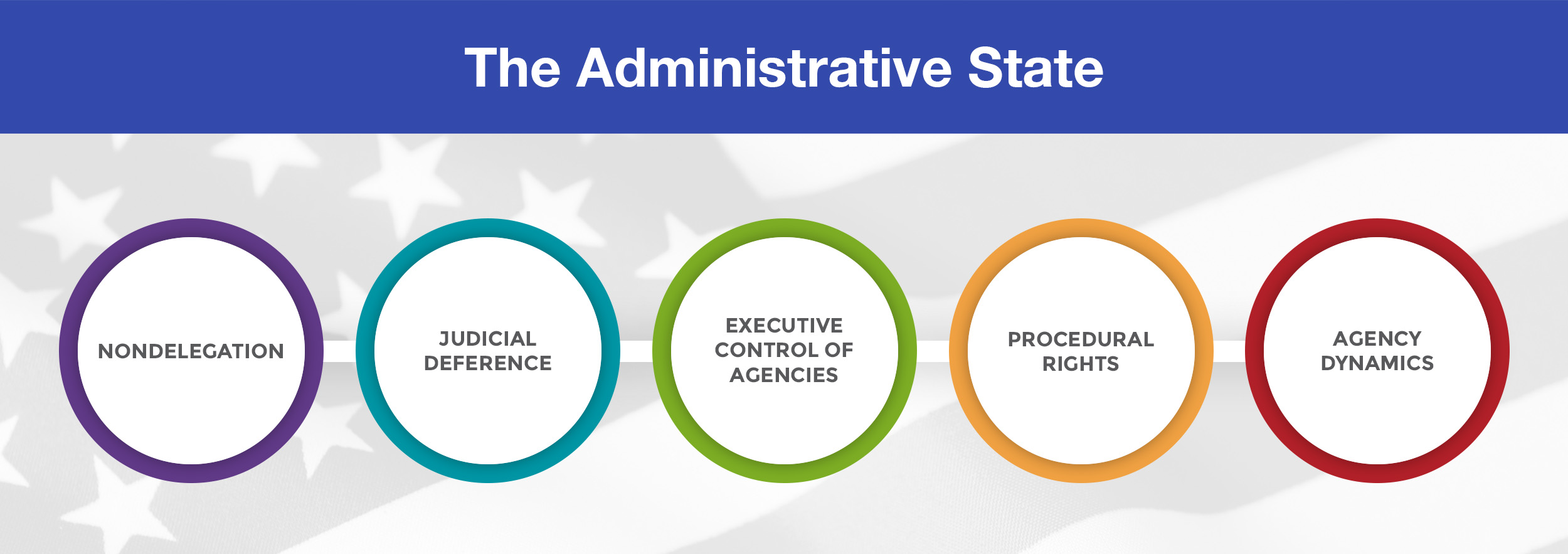Regulatory budget

| Administrative State |
|---|
| Five Pillars of the Administrative State |
| • Nondelegation • Judicial deference • Executive control • Procedural rights • Agency dynamics |
| Click here for more coverage of the administrative state on Ballotpedia |
Regulatory budget and regulatory budgeting refer to policies that limit the total costs that a federal administrative agency may impose through rulemaking. President Donald Trump (R) instituted the first regulatory budget in 2017 through Executive Order 13771. Members of Congress have crafted a number of federal regulatory budget proposals since 1978, but no such legislation had been enacted as of October 2019.[1][2][3][4][5]
Executive Order 13771, issued by President Donald Trump (R) on January 30, 2017, was the first executive action to establish a regulatory budget. The order instituted a regulatory cap on federal agencies for the remainder of fiscal year 2017, including a requirement that agencies eliminate two old regulations for each new regulation issued. The order also put forth procedures for the Office of Management and Budget (OMB) to determine annual regulatory cost allowances for agencies beginning in fiscal year 2018.[6][7][8]
Background
- See also: Compliance costs
According to a 2017 event page from the Mercatus Center at George Mason University, "The concept of a regulatory budget in the United States began as a bipartisan effort by Senator Lloyd Bentsen (D) and Representative Clarence J. Brown (R) in 1978."[4] The proposed legislation would have required Congress to establish annual limits on the compliance costs imposed by each federal agency through regulation.[1] Regulatory budgeting legislation has been proposed at other times at the federal level, but as of October 2017 no such law had been enacted. According to a 2016 working paper on regulatory budgeting from the majority staff of the United States House of Representatives Committee on the Budget:[1]
| " | President George H.W. Bush endorsed regulatory budgeting in his 1993 budget submission to Congress. His proposal would have provided agencies with regulatory allowances that would be the ceiling for increased regulatory costs imposed by each agency each year. Meanwhile, several members of Congress, including Senator Orrin G. Hatch (R-UT) and Representative Lamar S. Smith (R-TX), introduced legislation implementing a regulatory budget system.[9] | ” |
| —U.S. House Budget Committee Majority Staff, "Introduction to a Regulatory Budget" (2016)[1] | ||
In 2016, Representative Mark Walker (R) and Senator Mike Lee (R) introduced companion bills in their respective houses of Congress under the title Article I Regulatory Budget Act. In an article published by The Daily Signal, Senator Lee wrote that the legislation "would, for the first time, require Congress to vote on the total regulatory burden each federal agency may impose on the American people each year—a budget for federal regulatory costs to mirror Congress' annual budget for taxes and spending."[5][1]
See also
External links
Footnotes
- ↑ 1.0 1.1 1.2 1.3 1.4 U.S. House of Representatives Committee on the Budget, "Congressional Budgeting: Introduction to a Regulatory Budget," September 8, 2016
- ↑ National Affairs, "Putting Regulators on a Budget," Spring 2016
- ↑ R Street Institute, "Regulatory Budgeting: Lessons from Canada," March 2016
- ↑ 4.0 4.1 Mercatus Center, "Building a Regulatory Budget: What to Know and Where to Start," June 8, 2017
- ↑ 5.0 5.1 The Daily Signal, "The Case for a Regulatory Budget," May 23, 2016
- ↑ The White House Office of the Press Secretary, "Presidential Executive Order on Reducing Regulation and Controlling Regulatory Costs," January 30, 2017
- ↑ The Hill, "Lessons from the godfather of regulatory budgeting," February 23, 2017
- ↑ Politico, "Five big questions about Trump’s executive order on regulation," January 31, 2017
- ↑ Note: This text is quoted verbatim from the original source. Any inconsistencies are attributable to the original source.
| |||||||||||


